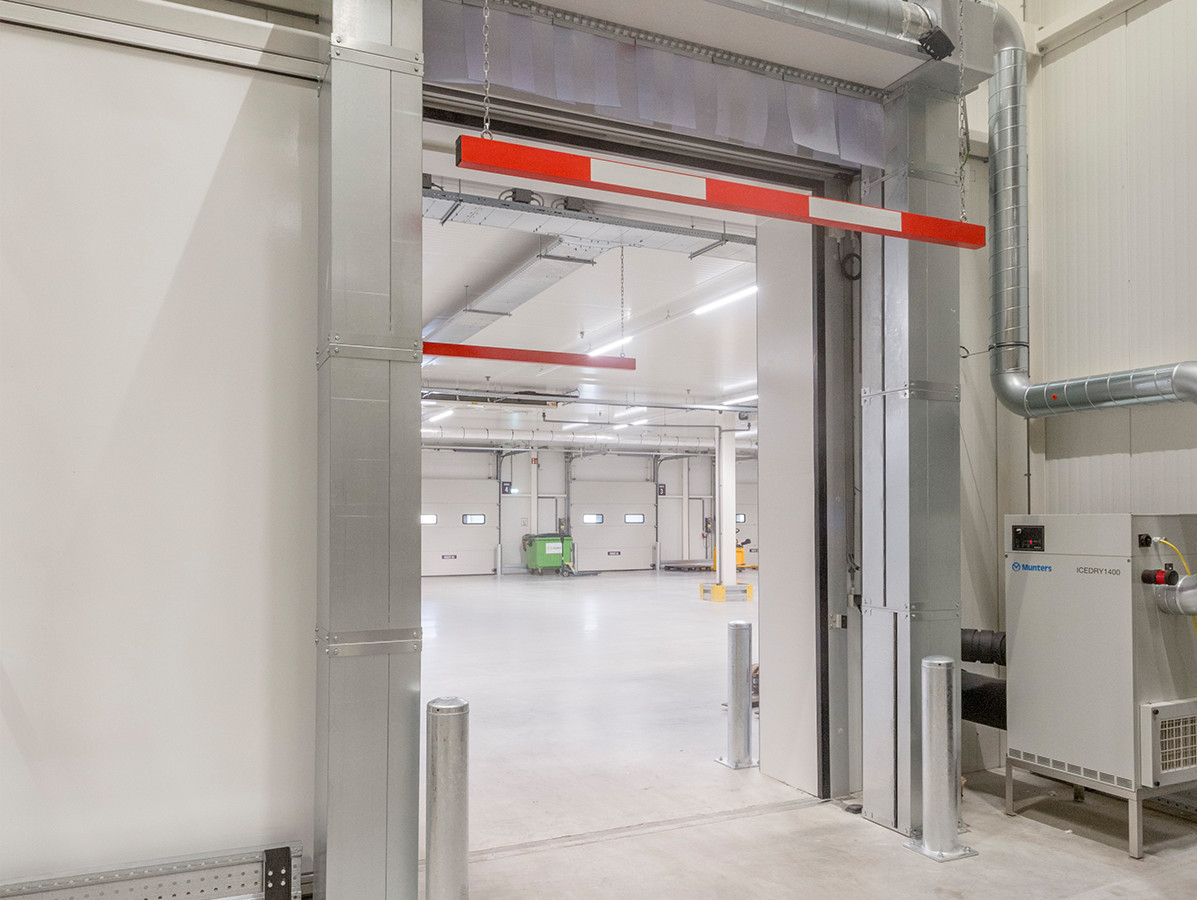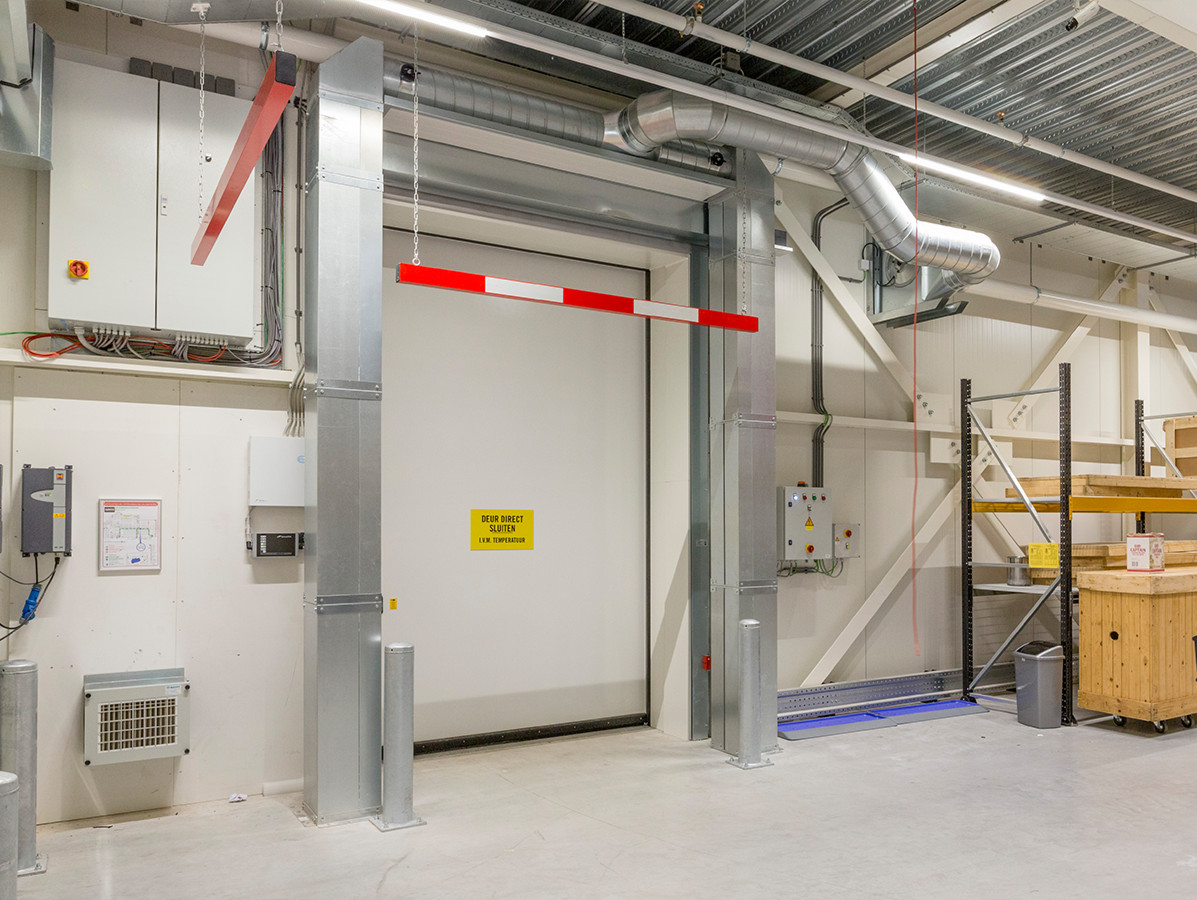
The installation of air doors in the premises of Hanos provides the company with many advantages. Not only do the various production and customer areas remain at the right temperature. The air separations also reduce energy consumption by 50%. Which is good for the environment and your wallet.
Rob Kuijpers, Head of General Affairs at Hanos, is very enthusiastic about the use of air doors.
The company has been using these air doors for some time now and has built up a lot of experience with them. Together with Ronnie Schiltmans of Prodoor, he discusses the advantages for the functioning of the Hanos premises. And what the role of the supplier is in the renovation and new construction of properties.
"I came into contact with Ronnie in 2012," Rob starts, "Hanos was already doing business with Prodoor for the daily service, maintenance and replacements of all industrial doors in our branches in the Netherlands and Belgium. In recent years, I have consciously involved him more and more in the construction team for the development of new buildings and renovations. To advise us on the correct application of a doorway." Rob explains: "In the past, everything was closed off with doors but these were actually left open pertinently because there was a lot of traffic in a short space of time. In that case, you lost the temperature and it took a lot of energy and money to get the room back to the right temperature. In order to reduce energy consumption, we had to find another solution."
"Air doors turned out to be the best solution," Rob explains. Ronnie continues: "With an air door, air is blown either from above or from two sides, which keeps the temperature in the different areas at the right level, for example between the freezer room and logistics department but also in the shops themselves. In Hengelo, for example, there is an open fish department. From a commercial point of view, you don't want to place a door there, but it's also not pleasant to smell the fish at the entrance. An air door prevents the smell from spreading during the day, and in the evening we close this area off with a roller shutter." " This allows us to continue working in a customer-friendly way and to reduce energy consumption," Rob adds. "In addition, the staff can simply carry out their work without pulling any 'strings' to open doors. And there are fewer damages."

At HANOS, the customer's interests come first, a personal approach with a great sense of service. Rob explains: "Every branch has its own specific requirements to meet this customer interest. Because we have been working with Prodoor for so long and know the results in conditioning rooms, we can quickly provide customised solutions. Nevertheless, there is always the possibility of something new coming up. In Hengelo, for example, we noticed that the temperature in the fish department was perfect, but that the refrigeration unit did not reach the right temperature. This cabinet suited the layout of the department but turned out to be placed too close to the air door, causing the cold to be blown out of the cabinet. A good learning experience.
According to Rob and Ronnie, the branches in Hengelo and Zwolle have become real design shops. "I am proud that we have realised this together", Rob emphasises. "Now it's time for the new building in Nieuwegein. With our experience and cooperation, decision-making is three times faster."
Ronnie addresses the quality of the Masterveil air doors applied at Hanos. "This manufacturer distinguishes itself with custom-made works with up to 50% less energy consumption. Due to the relatively narrow discharge of the systems, fewer kilowatts are needed to create the air separations. Contractors will be interested in the purchase price but end users are interested in return on investment." He continues: "For passageways with relatively large temperature differences (+25˚ to - 25˚) between rooms, it is impossible to prevent condensation and ice formation without Powerstream air doors, whether or not extended with dehumidification. ASK air doors are used to condition the products in the fresh produce halls (+20˚ to +8˚), fruit and vegetables, dairy and fish."
Food companies spend a lot of money on new buildings. According to Ronnie, after the keys have been handed over, the joy quickly turns to concern about condensation and ice forming. "That means new investments. We want to protect parties against this. After all, an architect can design a building but does not immediately focus on the influence of humidity. We do. The earlier we are involved in the construction or renovation, the better we can think about air conditioning, but also about fire, hygiene and energy. We have specialists in each subject. Hanos will not be affected by this problem anymore, they will gain from it for the company and for their customers.
Source: Vakblad Voedingsindustrie 2021